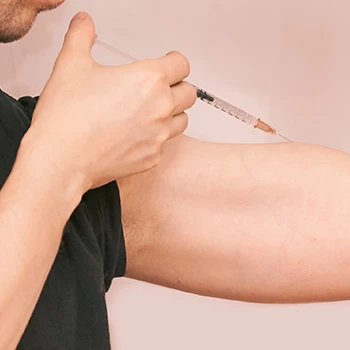As a pathologist, I've seen the critical role of steroids in managing diseases, injuries, and allergic reactions.
Athletes often use steroids for muscle gain and performance, but they're also sought for their potential to speed up recovery from inflammation and swelling.
However, not all steroids are effective against inflammation, and incorrect dosages can be harmful.
My collaboration with a colleague medical doctor has deepened my understanding of these risks.
Here’s what I found.
Quick Summary
How Do Steroids Suppress Inflammation?
In my experience, steroids, often more effective than NSAIDs, are crucial in managing severe inflammation.
While NSAIDs are suitable for milder cases, steroids, especially topical and oral forms, are vital for conditions like rheumatoid arthritis and inflammatory bowel disease.
As a pathologist, I've observed that doctors may prescribe anabolic drugs or corticosteroids for specific effects, particularly in managing inflammation in cases of high blood pressure and weight gain.
These corticosteroids work by inhibiting parts of the immune system responsible for inflammation [1]. In my practice, I often prescribe corticosteroids in forms like injections, tablets, and creams for skin or joint issues.
While inflammation usually protects tissue, it's detrimental in conditions like asthma, eczema, and arthritis, necessitating management to prevent long-term harm.
Different Effects Of Corticosteroids And Anabolics

From my medical perspective, a major issue with self-administered steroids is the lack of medical expertise in selecting the appropriate type and monitoring side effects.
This is why steroids are controlled substances and require a doctor's prescription. Here is how these common medical drugs interact with your body.
Corticosteroids
These are synthetic forms of a steroid called cortisol. It’s normal to have fluctuations, but there can be problems with stress levels and immune responses in extreme cases.
Because of their impact on the immune system and how they release proteins to trigger inflammation, corticosteroids have become a great tool for naturally reducing the trigger for inflammation, according to the Cleveland Clinic [2].
In my experience, corticosteroids can quickly reduce acute joint inflammation post-injury, but they don't address the underlying cause or offer long-term solutions.
Dr. Jason Winkelmann, a naturopathic doctor and a chiropractor at True Health Natural Pain Center, strictly warns against long-term steroid use.
“Cortisol keeps your immune system from making substances that cause inflammation. Corticosteroid drugs, like prednisone, work in a similar way.”
- Tyler Wheeler, MD, WebMD.com
Side Effects
While effective, long-term steroid use carries risks such as osteoporosis and adrenal suppression.
Moreover, a study published in the Cureus journal showed that prolonged exposure to steroids has been linked to increased anxiety, mood swings, and, in some cases, more serious mental health issues like depression in 142 out of 3138 patients [3].
This result underscores the need for mental health monitoring in long-term steroid therapy.
To mitigate these side effects, according to the Mayo Clinic, it's essential to follow a tailored treatment plan, often involving gradual dosage reduction and exploring safer alternatives like biologic therapies that target specific immune responses with fewer side effects [4].
Related Articles:
Anabolic Steroids

Anabolic steroids are typically synthetic substances that closely resemble the male sex hormone testosterone.
It’s typically prescribed for low testosterone levels and to deal with the impact of diseases or surgery to help the body strengthen again [5].
It’s these drugs that many athletes also decide to use in order to build up more muscle and strength than they are naturally able to.
But it’s important to understand that these anabolic drugs have much less of an impact on inflammation and, in many cases, have no impact at all.
Side Effects
Use without medical surveillance and prolonged use of anabolic steroids can lead to many side effects. The most common ones, according to the National Institute on Drug Abuse, include the following [6]:
- Depression
- Kidney failure
- Liver tumor
- Heart attack
Related Articles:
FAQs
How Quickly Do Steroids Reduce Inflammation?
Steroids reduce inflammation within four days in most cases. This mostly depends on the type and whether it’s injected, swallowed, or applied as a cream.
Do Anabolic Steroids Help Joint Pain?
No, anabolic steroids don’t tend to help joint pain. It’s mainly corticosteroids that are used for joint inflammation like arthritis. Anabolic steroids are typically used to improve muscle mass and strength.
References:
- https://www.ncbi.nlm.nih.gov/pmc/articles/PMC1751559/
- https://my.clevelandclinic.org/health/drugs/4812-corticosteroids
- https://www.ncbi.nlm.nih.gov/pmc/articles/PMC10185922/
- https://www.mayoclinic.org/prednisone-withdrawal/expert-answers/faq-20057923
- https://www.webmd.com/men/anabolic-steroids
- https://nida.nih.gov/research-topics/anabolic-steroids
About The Author
You May Also Like






